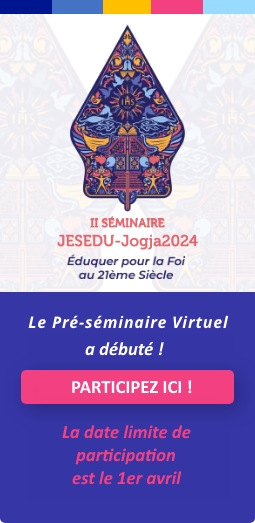The term “Virtual Colloquium” clearly refers to online meaningful conversations among a group of individuals or a community of scholars/educators. In our context here regarding the JESEDU-Jogja Virtual Colloquium, my experience is that it has been very engaging, pointedly and revealing of what the actual Colloquium would be when all the participants meet in Indonesia. At first, as a school representative, I was slow in getting involved in this excellent community conversations due to my busy schedule (va-et-vient), but I picked up the zeal to actively participate henceforth, when I saw some of the inspiring comments and video clips posted by the participants and the organizers respectively.
So far, JESEDU-Jogja Virtual Colloquium has been thought provoking, especially on the insights and brilliant/critical analysis on the issues bedeviling our society visa-vis youths’ formation and care for our common home. In fact, among all the issues and topics we’ve so far discussed on this platform, I found three video clips posted on the: (i)Building Reconciliation, (ii)Cultivating depth and (iii) Choosing Purpose, very captivating. In all these video clips, we listen and receive a clear invitation to act positively, to change our way of thinking and doing things; and above all to collectively affirm that all is not going well in most of our educational system in particular, and in the society in general.
Flowing from some of the comments and views I already shared on the ongoing Virtual Colloquium, I reiterate here that our broken humanity needs more than ever a collective effort to constructing bridges and not walls; we are in need of a wholesome reconciliation not animosity and disunity. The video clip on ‘building reconciliation’ brings to light some of the challenges we face in implementing the UAPs. Our common failure as people to see each other as human beings created with dignity and respect, the widening socioeconomic gap and religious radicalism (as in the case of Nigeria), are in one form negates this wisdom embedded in the zulu greeting “Sawubona.” We cannot deny today, irrespective of culture or race that some human values that once existed in our societies continue to be eroded by economic and social injustices. For a meaningful reconciliation to take place, we need to affirm unequivocally the situational reality of the other person, and that of our common home (planet earth) and to be nudged positively into collective action of change. In view of this concern, all our Jesuit schools in Nigeria, have included in the curricula “Christian service program.” Through this program, which is mandatory, we consciously ensure that our students are exposed not simply in a formal classroom discussion but, on site experience on the issues surrounding socioeconomic inequality, care of the abandoned and for our common home.
More so, the video clip on ‘cultivating depth’ illustrates painfully where we are as people and the tension, we face daily in educating our youths. We cannot pretend that this tension is unreal, neither do we say that the tension will disappear soon if we keep fanning the flame by maintaining the status quo: relativism and fundamentalism in the age of social media. The wisdom, which every educator should strive to uphold is to know when and how to strike a balance. However, our mission of educating our youths today calls for a deeper reflection and reassessment not simply on the way we do things but, also on what and how we teach our students – school curricula and classroom management. It must be noted that the trend of “globalization of superficiality” is hatched by some of the school curricula that glorifies “quick fix” or “easy solution” to every problem and in consequence abhors critical and reflective thinking. As such, we live unfortunately in an era whereby any task that seems difficult to accomplish ought to be avoided, abandoned or to be unscrupulously thrown away. Notably, in choices we make daily as educators, learners and as human beings in general, we see a growing desire for a “quick fix,” unguarded desire for “transient good,” because we lack discernment in ‘choosing purpose.’
In summary, to attain what is at the heart of the UAPs: to accompany the young people, to walk with the poor and the outcasts and to care for our common home, we need to order our choices (social, economic, political, religious and educational) on what transcends mere pleasures and the “quick fix” culture (hic et nuc), and by so doing embrace the “greater good,” which hinges in God and for God alone!







Se connecter ou Adhérer
pour créer et afficher des commentaires
